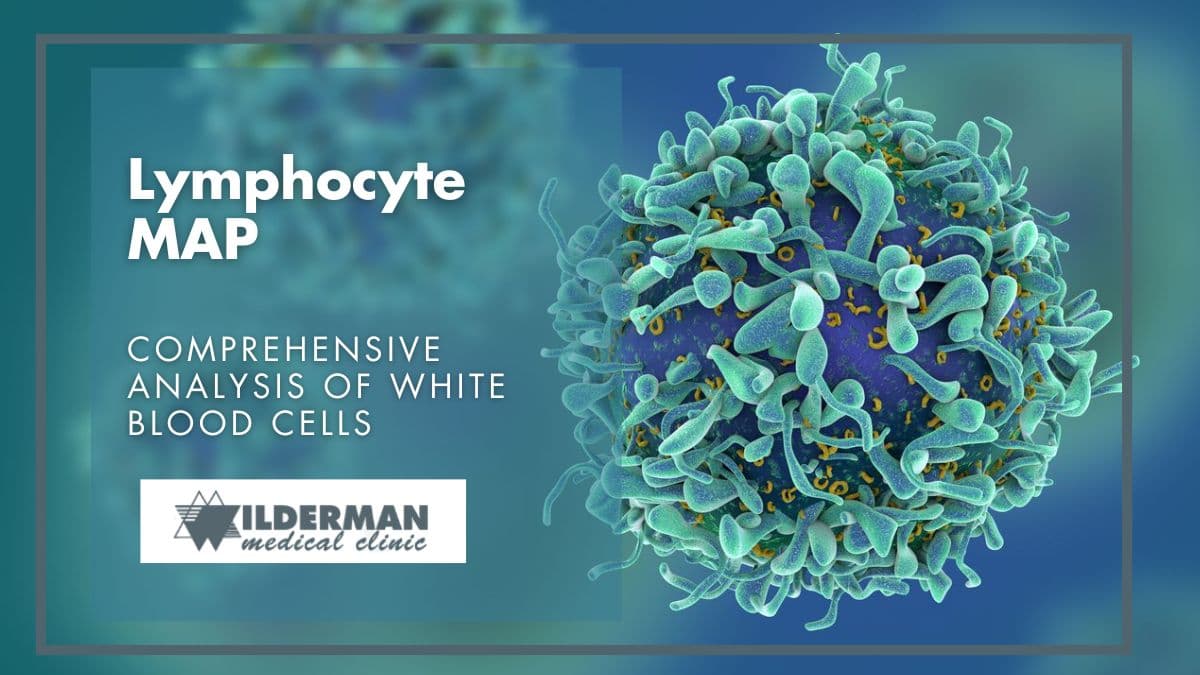Lymphocyte MAP

What is Lymphocyte MAP?
Lymphocyte MAP (Multiparameter Analysis of Lymphocyte Populations) is an advanced method used by scientists and doctors to study different types of lymphocytes in our bodies. Lymphocytes are a type of white blood cell that plays a key role in the body’s immune system. They help the body fight off infections and diseases by recognizing and attacking harmful invaders like viruses and bacteria.
The process begins by collecting a sample of blood or tissue containing lymphocytes from a person. This sample is typically obtained through a simple blood draw or, in some cases, a biopsy of tissue.
Once the sample is collected, scientists utilize advanced technologies such as flow cytometry, mass cytometry, and imaging techniques to perform high-resolution analysis of lymphocytes. These technologies allow for the simultaneous examination of multiple parameters with high sensitivity and accuracy.
So, instead of just looking at one thing, like how many lymphocytes there are, Lymphocyte MAP looks at lots of different things about them all at once. This includes things like what they look like (cellular morphology), what’s on their surface (cell surface markers), and how they work (functional attributes).
This method gives a more detailed picture compared to the usual methods like Complete Blood Count (CBC) or basic immunophenotyping. It helps scientists and doctors to see the different types of lymphocytes more clearly and understand them better.
CBC vs Basic Immunophenotyping vs Lymphocyte MAP
Here’s a comparison of CBC, basic immunophenotyping, and Lymphocyte MAP:
Complete Blood Count (CBC):
- What it does: CBC is a common blood test that provides basic information about the quantity and characteristics of different blood cells, including red blood cells, white blood cells, and platelets.
- Focus: It primarily focuses on counting the total number of white blood cells, without providing detailed information about specific types or subsets.
- Application: CBC is routinely used in healthcare settings for general health assessment, screening for infections or anemia, and monitoring certain medical conditions.
Basic Immunophenotyping:
- What it does: Basic immunophenotyping involves using antibodies to identify and categorize different types of white blood cells, including lymphocytes, based on specific cell surface markers.
- Focus: It provides more detailed information compared to CBC by distinguishing between major subsets of white blood cells, such as T cells, B cells, and natural killer (NK) cells.
- Application: Basic immunophenotyping is commonly used in immunology and clinical diagnostics to assess immune system function, identify abnormalities in lymphocyte populations, and aid in the diagnosis of immune-related disorders.
Lymphocyte MAP (Multiparameter Analysis of Lymphocyte Populations):
- What it does: Lymphocyte MAP is an advanced technique that comprehensively analyzes and characterizes lymphocyte populations in biological samples, such as blood or tissue.
- Focus: It integrates multiple parameters, including cell surface markers, cellular morphology, and functional attributes, to provide a detailed and multidimensional profile of lymphocytes.
- Application: Lymphocyte MAP offers a more nuanced understanding compared to basic immunophenotyping by examining various aspects of lymphocyte biology simultaneously. It has diverse applications in immunology, clinical diagnostics, research, and treatment optimization for immune-related disorders, including immunodeficiency diseases, autoimmune conditions, cancer immunotherapy, and transplantation medicine.
In summary, while CBC provides basic information about blood cell counts, basic immunophenotyping offers more detailed insights into white blood cell subsets. Lymphocyte MAP goes even further by providing a comprehensive analysis of lymphocyte populations, offering valuable insights into immune system function and dysfunction for various clinical and research purposes.
Key Features of the Lymphocyte MAP
The key features of Lymphocyte MAP include:
- Multiparameter Analysis: Lymphocyte MAP integrates multiple parameters such as cell surface markers, cellular morphology, and functional characteristics to comprehensively profile lymphocyte populations.
- High Resolution and Sensitivity: The technique offers exceptional resolution, enabling the identification of rare or aberrant lymphocyte subsets that might evade detection with conventional methods.
- Quantitative and Qualitative Insights: Lymphocyte MAP not only quantifies different lymphocyte populations but also provides qualitative insights into their activation status, maturation stage, and functional attributes.
- Customization and Flexibility: Clinicians can tailor Lymphocyte MAP assays to target specific lymphocyte subsets or immunological parameters of interest, ensuring versatility in research and clinical applications.
- Wide Range of Applications: Lymphocyte MAP has diverse applications in immunology, clinical diagnostics, and research, including the diagnosis and monitoring of immunodeficiency disorders, autoimmune diseases, cancer immunotherapy, transplantation medicine, and immune-mediated diseases.
Clinical Applications
Lymphocyte MAP can be utilized for various clinical purposes:
- Provide valuable surrogate markers for diagnosing autoimmune diseases, immune deficiencies, allergies, and hypersensitivities.
- Offer insights into underlying immune imbalances that may contribute to complex diseases.
- Illuminate the impact of environmental triggers on the immune system, potentially leading to disease development.
- Aid in the early identification of immune conditions, allowing for timely intervention to prevent over-reactions (autoimmunity) or under-reactions (immune deficiencies) of the immune system.
- Offer a detailed immune profile to assist in planning treatment strategies and monitoring their effectiveness.
Lymphocyte MAP represents a significant advancement in immune system analysis, revealing crucial associations with various disease conditions.
Who Could Benefit from Lymphocyte MAP?
Lymphocyte MAP offers valuable insights and benefits to different groups of people:
- Patients with Suspected Immunological Disorders: This includes individuals experiencing frequent infections, unusual swelling of lymph nodes, or strange autoimmune symptoms that are hard to explain.
- Cancer Patients on Immunotherapy: For those fighting cancer and receiving treatments like immune checkpoint inhibitors, Lymphocyte MAP helps doctors see how well the treatment is working and predict any possible side effects related to the immune system (Leman et al., 2018).
- Transplant Patients: People who have undergone organ or stem cell transplants need careful monitoring to ensure their body doesn’t reject the new organ or develop graft-versus-host disease.
- Clinical Researchers: Scientists studying different diseases and working on new ways to treat them also find Lymphocyte MAP helpful. It gives them a deeper understanding of how the immune system plays a role in various illnesses and helps them develop better treatments (Franco et al., 2021).
Conclusion
Lymphocyte MAP is leading the way in diagnosing immune-related issues by providing unmatched insights into different types of white blood cells. Its ability to look at multiple aspects at once with great detail makes it incredibly valuable.
This technique has the potential to greatly improve our understanding of immune disorders and help doctors provide better care for patients in various situations.
Reference
Lymphocyte Map. https://lymphocytemap.com/.
Hagmeyer, David. The Lymphocyte Map. https://www.drhagmeyer.com/the-lymphocyte-map/.
Leman JK, Sandford SK, Rhodes JL, Kemp RA. Multiparametric analysis of colorectal cancer immune responses. World J Gastroenterol. 2018 Jul 21;24(27):2995-3005. doi: 10.3748/wjg.v24.i27.2995. PMID: 30038466; PMCID: PMC6054948.
Franco C, Gatto M, Iaccarino L, Ghirardello A, Doria A. Lymphocyte immunophenotyping in inflammatory myositis: a review. CurrOpinRheumatol. 2021 Nov;33(6):522-528. doi:10.1097/BOR.0000000000000831.
Need to get in touch?
Address: 8054 Yonge Street Thornhill, Ontario L4J 1W3
Phone: (905) 886 1212
Latest articles
April 29, 2024
April 29, 2024
April 29, 2024
April 29, 2024
April 29, 2024





